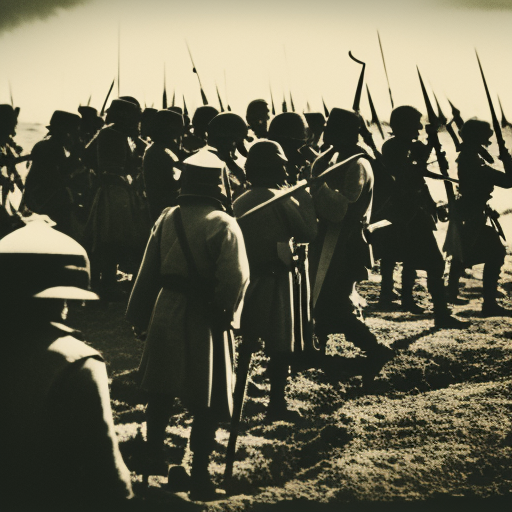The Battle of Talikota (1565)
The Battle of Talikota, also known as the Battle of Rakshasa-Tangadi, took place on January 23, 1565, in the Deccan region of southern India. It was a significant event in Indian history as it marked the end of the Vijayanagara Empire and the beginning of a new era.
Background:
The Vijayanagara Empire, founded in 1336 by Harihara and Bukka, had become a dominant power in southern India. It was known for its prosperous trade, art, and architecture. However, by the mid-16th century, the empire faced internal conflicts and external threats from neighboring sultanates.
Causes:
The primary cause of the Battle of Talikota was the rivalry between the Vijayanagara Empire and the Deccan Sultanates. The empire had been expanding its territory, encroaching upon the sultanates’ domains. Additionally, religious differences between the Hindu Vijayanagara Empire and the Muslim sultanates fueled tensions.
Key Players:
The Vijayanagara Empire was led by Aliya Rama Raya, who was the regent for the young king, Sadasiva Raya. The Deccan Sultanates were a coalition of five Muslim kingdoms: Bijapur, Ahmadnagar, Golconda, Bidar, and Berar. They were led by Ibrahim Adil Shah II of Bijapur.
The Battle:
The battle took place near the village of Talikota, located in present-day Karnataka. The Vijayanagara forces were heavily outnumbered, with estimates ranging from 200,000 to 500,000 soldiers against the Sultanates’ combined force of around 500,000 soldiers.
The Vijayanagara army, known for its superior cavalry, initially gained an advantage by launching a surprise attack. However, the Sultanates’ forces regrouped and launched a counterattack. The battle was fierce, with both sides displaying great valor and determination.
Despite their initial success, the Vijayanagara forces were eventually overwhelmed by the sheer numbers of the Sultanates’ soldiers. The empire’s army suffered heavy casualties, and Aliya Rama Raya was captured and executed. The defeat was a devastating blow to the Vijayanagara Empire.
Aftermath:
The Battle of Talikota had far-reaching consequences. The Vijayanagara Empire, once a powerful and prosperous kingdom, was left in ruins. The victorious Sultanates looted and destroyed the capital city of Vijayanagara, Hampi, and its magnificent temples and palaces.
The defeat of the Vijayanagara Empire marked the end of Hindu dominance in southern India and the rise of the Deccan Sultanates. The Sultanates divided the former empire’s territories among themselves, establishing their own regional powers.
The battle also had a profound impact on the cultural and religious landscape of the region. Many Hindu temples and monuments were destroyed, and the surviving population faced persecution and forced conversions to Islam.
Legacy:
The Battle of Talikota is considered a turning point in Indian history. It marked the decline of the Vijayanagara Empire and the beginning of a new era of Muslim dominance in the Deccan region. The battle’s impact on the cultural and religious fabric of the area is still felt today.
The ruins of Vijayanagara, including the temples of Hampi, are now a UNESCO World Heritage Site and attract tourists from around the world. The battle’s legacy serves as a reminder of the complex and often tumultuous history of India and the enduring impact of military conflicts on societies.












